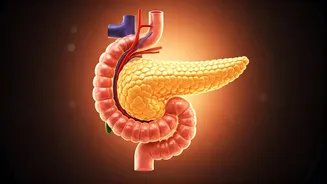Dietary Concerns Raised
The traditional Indian diet, often laden with high-carb foods, is a significant topic of discussion within the healthcare community, particularly concerning
diabetes. Doctors have pointed out that the frequent consumption of white rice and refined wheat, staples in many Indian meals, can elevate the risk of developing diabetes. This is attributed to the quick conversion of these foods into glucose, leading to a rapid spike in blood sugar levels. The article highlights that a shift away from this dietary pattern could be beneficial for individuals looking to control their blood sugar levels and decrease their susceptibility to diabetes. Furthermore, it underlines the importance of being informed about the nutritional content of the everyday meals.
Traditional Indian Diet
The essence of the traditional Indian diet lies in its heavy reliance on certain key food groups, such as white rice and refined wheat. These ingredients are frequently used in a variety of dishes across the country, forming the base of numerous meals. The high carbohydrate content of these foods is a matter of concern. Carbohydrates, once ingested, are quickly processed and transformed into glucose. This process causes a surge in blood sugar. The recurring consumption of such foods could put strain on the body's ability to regulate blood glucose. This dietary style could result in higher instances of blood sugar spikes, which consequently elevate the risk of diabetes. Therefore, understanding the impact of these diet choices is vital for managing health.
Impact of Consumption
The ongoing consumption of white rice and refined wheat can have several implications for health, specifically regarding diabetes. High levels of these carbohydrates in the diet often lead to frequent and significant elevations in blood glucose levels. For individuals with a predisposition to diabetes, or those already diagnosed, these fluctuations could exacerbate the condition. Furthermore, consistently high blood sugar levels can make it harder for the body to manage insulin. The cumulative impact increases the likelihood of insulin resistance and escalates the risk of type 2 diabetes. By recognizing these effects, individuals can make educated food choices to avoid potential issues and promote better control of their blood glucose levels.
Expert Recommendations
In light of the identified risks, healthcare professionals recommend certain dietary adjustments to help mitigate the likelihood of diabetes. These often include moderating the intake of high-carb items like white rice and refined wheat. Instead, the advice centers around increasing the consumption of foods that are lower on the glycemic index. Adding more vegetables, lean proteins, and complex carbohydrates to daily meals is generally recommended. Additionally, promoting a balanced diet with a focus on portion control, as well as regular physical activity, can significantly contribute to better blood sugar management. By embracing these modifications, people can proactively safeguard their health and lessen the chances of diabetes.
Making Dietary Changes
Making changes to dietary habits might seem challenging initially, but there are several easy ways to begin. Start by carefully assessing the carbohydrate content in each meal. Consider swapping white rice for alternatives like brown rice, which has a lower glycemic index and provides additional fiber. Similarly, opt for whole-wheat products instead of refined wheat-based foods, such as white bread. Integrating more vegetables and proteins into each meal can help reduce the overall carbohydrate load and support healthy blood sugar levels. It's also critical to gradually adjust portion sizes to avoid excessive consumption. Seeking guidance from a healthcare provider or a registered dietitian can provide personalized advice and support, making the transition to a healthier diet manageable and sustainable.






















